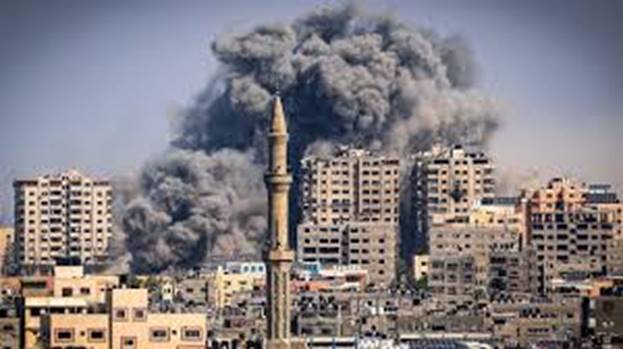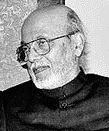

If there be a long-term solution to the tragedy of Palestine, indeed to the wave upon wave of tragedies facing the Islamic world, it is in Economic Taqwa. That is Taqwa applied to economics – Photo The Economist
Lessons from Palestine: Patience, Forbearance, and Economic Taqwa
By Dr Nazeer Ahmed
Concord, CA

History is a great teacher. At this moment in history, the world of Islam is hit with one tragedy after another. From Jerusalem to Damascus, from the Rohingyas of Myanmar to the Uighurs of China, it is the same story. The crescent extending from Kabul to Tripoli lies in ruins, embracing the people of Afghanistan, Iraq, Syria, Yemen, Libya, Somalia, Bosnia, Sudan, and Palestine.
Not a day goes by when we are not treated to the macabre dance of death on the shores of Gaza, the sight of shattered limbs of men, women, and children flying through the air. A genocide of historic proportions stares us in the face. There is not a Muslim man or woman I know who has not shed tears of blood in his heart at this monstrous tragedy. So have millions of men and women of goodwill of all faiths around the globe, including Christians and Jews.
The current difficulties offer us a historic opportunity for an internal renewal of Islamic civilization. Just as we use reaction wheels to correct the course of a spacecraft that is losing altitude or correct the attitude of an airplane in a nose dive by applying a torque to a gimbal or an electric pulse to a control system, a civilization needs an occasional correction to keep it on-course its heavenly mandate.
History is a Sign on the great canvas of time that stretches from infinity to infinity. God’s purpose is revealed through history. The Qur’an declares: Sa Nureehim Ayaatina fil Afaq, wa fi Anfusihim, Hatta Yatabayanahuml Haq (Soon shall we show them our Signs on the horizon and within their own souls until it is clear to them that it is the Truth). On the horizon connotes history and nature.
The challenges faced by Muslims today are similar in many ways to those of the thirteenth century CE. It was in that century that the Islamic world was overwhelmed by simultaneous invasions of the Mongols from the east and the crusaders from the west. In the year1212, at the battle of Las Novas de Tolosa, Muslims lost Spain (except Granada). Barely seven years later, in 1219, Genghis Khan descended from Mongolia and in a span of two years obliterated more than half of the Islamic world. A vast swath of Eurasia including Kazakhstan, Uzbekistan, Turkmenistan, Afghanistan, Iran, Iraq, Anatolia, Syria, and Pakistan up to the river Indus lay in ruins.
The destruction was total. Ninety percent of the population perished. Political and social institutions that had grown up over a period of five hundred years in the golden period of Islam were destroyed. Libraries burnt. Ulema beheaded. Dams and canals leveled. Agriculture disappeared. Towns and villages became pastures for Mongol horses. In one instance, in the city of Bamyan in Afghanistan, Genghis Khan slaughtered all the men, women, and children. Not even the donkeys were spared; so much so that the Mongols called it the City of Sorrow. The analogy with the ongoing genocide in Gaza is all too obvious.
While the cities were destroyed by the Mongols, and the madrassahs burned, the Awliya who had stayed outside of the state structures, were spared. These were the people of the spirit. They were the men and women who transformed hearts and aligned them with the wavelengths of Allah. Within a generation of the fall of Baghdad in 1258, the Mongols had accepted Islam and the light of Muhammed replaced the darkness of a Shamanist empire.
So, what lessons can we learn from the tragedy of Palestine? These are lessons of faith and fortitude, patience and forbearance. Even as they experience a genocide, the people of Palestine have become teachers to the world. They teach the world the lessons of forbearance (tahammul), patience (sabr) and trust in the divine will. I remember a photograph of a Palestinian father in Gaza holding the shattered body of his infant son, blood dripping from its white shroud. Lifting up the baby towards the heavens, he cried out: Hasbunallahu Ne’mal Wakil, Ne’mal Maula Wa Ne’man Naseer, Sufficient is Allah as the guardian, sufficient is He as the protector and helper. History will ask us: At that moment of overwhelming tragedy, did that Palestinian father exhibit the faith of Abraham and the forbearance of Jesus? The answer is a resounding yes.
Never give up hope in the mercy of Allah. Remember, every oppression has within it the seeds of its own destruction. The might of the Pharaoh was brought down by Moses who grew up within the palace of the Pharoah. Moses is within each of us. Abraham is within each of us. Jesus is within each of us. So is the Light of Mohammed (peace be upon them all).
What drives the oppression of the present times is economic centration. The top one percent of the people own ninety percent of the wealth of the world. Afghanistan, Iraq, Syria, Libya, Eritrea, and now Palestine are mere symptoms of this inexorable movement towards economic centration. It has created an inverted social pyramid. If left uncorrected it will topple over and will end in a monumental disaster for all humankind.
Let us not be despondent about the tragedy of Palestine. Let us look upon it as a Sign from Allah. Ask not why it is happening. Ask: what is Allah teaching us through the martyred infants of Palestine whose bodies are shattered to pieces before the infants have smelled a flower or have seen a butterfly? And the widows and the orphans and the men without limbs or eyes.
In this age, when states arrogate more and more power to themselves, when autocracy is the rule rather than an exception, when the citizen is marginalized and sidelined from decision-making, what is an individual to do about the oppression in Palestine?
Diplomats are working on short-term solutions to the Palestinian crisis. These are well-known to everyone. However, a long-term strategy must strike at the roots of oppression.
If there be a long-term solution to the tragedy of Palestine, indeed to the wave upon wave of tragedies facing the Islamic world, it is in Economic Taqwa. That is Taqwa applied to economics.
Economic Taqwa is a powerful idea whose time has arrived. The word Taqwa derives from the root verb q-w-a. It means to guard, protect, preserve. Let me illustrate the idea with an example.
When you build a space telescope, you also build a light shield to keep the stray light away so that the telescope can focus on the light from the star or galaxy of interest. To see the stars in the heavens you must first turn off the lights in your own house. The analogy applies to economics.
Economic Taqwa connotes sound economics that denies the oppressor the fodder that sustains him and propels his engines of oppression. The idea applies to individuals and nations alike.
Look at the economic edifice of the world. Is it not built on interest and riba? Every nation in the world is steeped in debt on which an exorbitant sum is collected by the money lenders as interest. The total debt in the world stands in excess of US $307 trillion as of today. Debt servicing absorbs hundreds of billions of dollars each year. In many of the poorer countries, the interest on public debt far exceeds the sums expended on health and education.
While some of this debt is incurred for legitimate development projects, a great deal is siphoned off by corrupt politicians and bureaucrats.
Who are the ultimate creditors for this debt that they impose on the world by our fiat currencies?
Debt and interest are established pillars of the current world order. They are propelled by greed and a desire to dominate and are sustained by coercive means. History is witness that excessive debt and interest destroy vast kingdoms and great empires. The last significant example of this was the Ottoman Empire.
If you wish to understand the roots of conflicts around the world, follow the money trail. Ask yourself: who benefits from this conflict? The genocide in Palestine is no exception to this rule. To what extent is it driven by the discovery of trillions of dollars of gas in the eastern Mediterranean near Gaza or the plan to build a waterway connecting the Gulf of Aqaba with the Mediterranean Sea bypassing the Suez Canal not to mention the stranglehold on Mideastern oil? This is on top of the diabolical thrust of a racist and domineering ideology on a hapless population.
This is not to minimize the complexities of global economics. Politics, history, technology, productivity, governance, peace and stability, taxation, savings, investments, trade, corruption, ecology, and human behavior are all drivers of economic life. Nonetheless, our observations on debt and interest stand. In very simplistic terms: investment is good, debt is bad.
Divine guidance on riba is clear. The Qur’an declares: “Those who consume usury shall not stand except as one who has lost his senses by the touch of Satan. That is because they say: “Trade is not but similar to usury”. Lo! God has permitted trade but has forbidden usury.” (Qur’an, 2:275)
Economic Taqwa starts with the individual and the family. Avoid consumer debt. Shun riba. Do not be wasteful. “Indeed, God does not love the wasteful “. (Qur’an, 6:141). Save and invest in things of value. Do not squander. “Indeed, God does not love those who squander” (Qur’an, 7:31). Do not indulge as is done in lavish weddings or buying expensive cars and trinkets for showoff. “Indeed, God does not love the fariheen (those who exult)”. (Qur’an, 28:76).
What is true for the individual is true for the community. When a dollar enters the community, keep it in the community. Acquire the knowledge, education, and skills and learn to become entrepreneurs. Trade with each other, locally, nationally, and internationally Patronize your own businesses and show them how to deliver competitive products and services of the highest quality on time. The Chinese, the Koreans, the Vietnamese and so many other communities in the United States have prospered this way. Do not give your dollar to any Islamophobic oppressor who would oppress your children and grandchildren.
Encourage the ethics of honesty, integrity, fairness, efficiency, and excellence in the family, the community, and in Islamic countries. Indeed, God loves the Muhsineen (those who excel in good deeds). Ehsan is the essence of Economic Taqwa.
For too long has the Islamic world toiled under the yoke of exploitative oppressors. Is it not time to move past short-term patches and adopt long-term strategies that break the shackles and help discard the yoke?
A believer must always be hopeful in the mercy of Allah. The Laws of Allah are eternal and inviolate. Every tyrant brings about his own destruction. Every oppressor carries his own firewood into hellfire on his own back. Every household of a Pharoah produces its own Moses. It is the promise of Allah that after every difficulty there is relief, after every difficulty there is relief.
(The author is Director, World Organization for Resource Development and Education, Washington, DC; Director, American Institute of Islamic History and Culture, CA; Member, State Knowledge Commission, Bangalore; and Chairman, Delixus Group)

